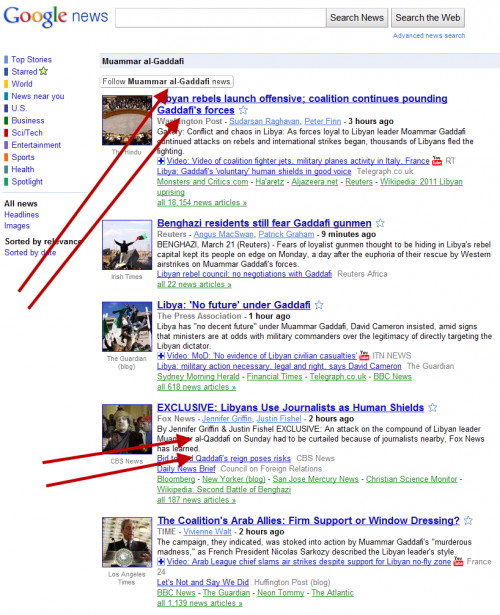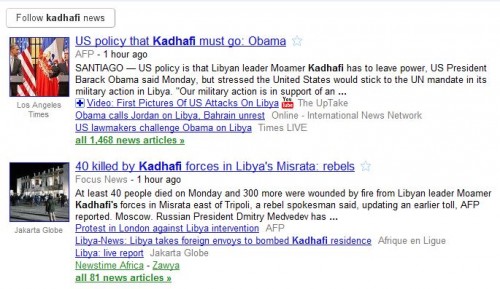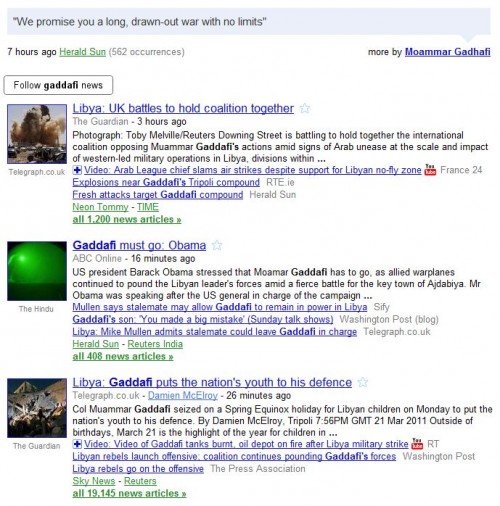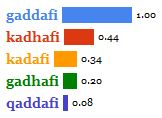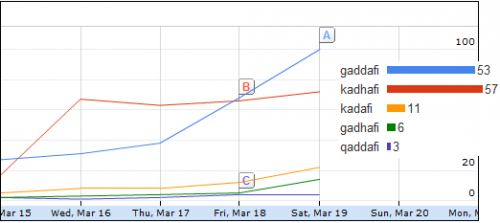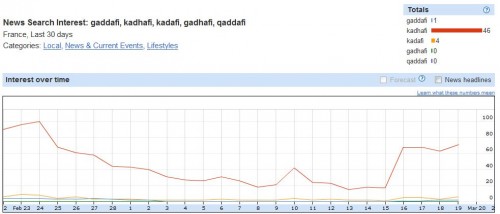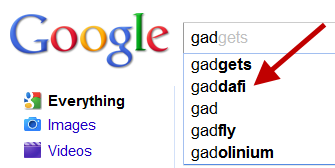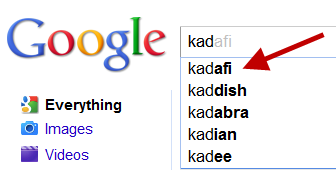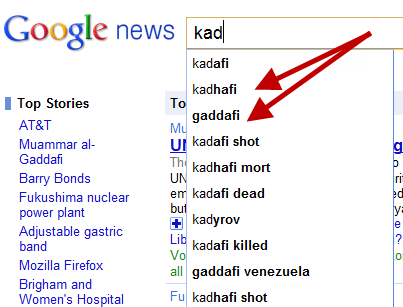Kadafi, Gaddafi, Qaddafi: In The Age Of Search, News Publications Still Struggle With Libya Leader’s Name
A decades-old dispute involving Libya remains unresolved. How do news organizations spell the name of Libya’s leader, Muammar Gaddafi? The exact spelling has a bigger impact these days, where people search for news. Use the wrong spelling, and your story might go missing. Can search tell us the “right” one? More below. Google News: A […]
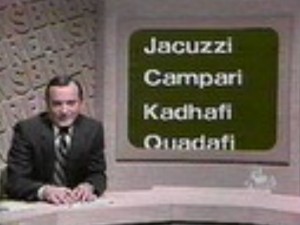 A decades-old dispute involving Libya remains unresolved. How do news organizations spell the name of Libya’s leader, Muammar Gaddafi? The exact spelling has a bigger impact these days, where people search for news. Use the wrong spelling, and your story might go missing. Can search tell us the “right” one? More below.
A decades-old dispute involving Libya remains unresolved. How do news organizations spell the name of Libya’s leader, Muammar Gaddafi? The exact spelling has a bigger impact these days, where people search for news. Use the wrong spelling, and your story might go missing. Can search tell us the “right” one? More below.
Google News: A Copy Editor’s Nightmare
Consider this page from Google News, the “Muammar al-Gaddafi” page that pulls in headlines from all over the world about the leader:
That page would give any newspaper copy editor fits, given that there are at least four different spellings showing up:
- al-Gaddafi
- Gaddafi
- al-Qaddafi
- Qaddafi
That’s just for the leader’s last name. His first name is spelled in at least two different ways, on that page.
A Name By Any Other Spelling Doesn’t Search As Sweet
Now consider people who keyword search for news. If they search for kadhafi, they get these headlines:
Now search for exactly the same person, only with a different spelling of gaddafi, and you get a different set of results, lead by different publications:
Notice that quote at the top of the page? That quote page again reflects the lack of unity on spelling Gaddafi’s news in the journalism world:
Survey Says: News Organizations Disagree
I checked several major news publications in the United States, as well as the UK, Canada and some for India and Japan. You can see the lack of agreement, even among the three major wire services, AP, AFP and Reuters, which I also checked:
Gaddafi: Reuters (Wire), Washington Post (US), Huffington Post (US), The Guardian (UK), The Telegraph (UK), The Times (UK), The Mirror (UK), The Sun (UK), The Mail (UK), Bild (Germany), Times Of India (India), Daily Yomiuri (Japan). Asahi Shimbun (Japan)
Gadhafi: Associated Press (Wire), Wall Street Journal (US), USA Today (US), San Jose Mercury News (US), Chicago Tribune (US), Toronto Star (Canada), The Globe & Mail (Canada)
Kadafi: Los Angeles Times (US)
Khadafy: New York Daily News (US) & New York Post (US)
Kadhafi: AFP (Wire)
Qaddafi: New York Times (US)
At first glance, most publications seem to go with “Gaddafi,” but that’s largely due to the UK. Every major UK publication I checked used that spelling, unlike the disagreement among US papers and the wire services. Two major Canadian papers went with “Gadhafi.”
Even Gaddafi Doesn’t Say What’s Right
Who’s right? An interesting AP story suggests that the AP is writing the name in English as Gadhafi (the AP spelling) would prefer:
The Associated Press goes with Gadhafi. Why? It has to do with pronunciation – along with a series of letters the Libyan leader sent to American schoolchildren more than 25 years ago….
How does Gadhafi himself pronounce it? That’s easy since he refers to himself in third person quite often. He tends to say “Gath-thafi” with the middle letter pronounced like the soft “th” in “either.”….
Flash back to 1986, a year that started out with the AP (and many others) spelling the Libyan leader’s name Khadafy, based on the advice of Middle East experts. That changed when he sent letters to American schoolchildren, signed in Arabic script over his typed name: Colonel Moammar El-Gadhafi.
The story goes on to say that, however, the AP also chooses to drop the definitive marker of “El” from names, which is why it ends up with “Gadhafi” — which isn’t, in the end, how he seems to write it.
Then again, The Reid Report does a fantastic round-up on how on what’s apparently Gaddafi’s official site, he goes with “Al Gathafi” there. That round-up also covers a number of spellings used in 2002, where the Libyan Broadcasting Corporation disagrees with Gaddafi’s official site as well as the Libyan embassy — not to mention the US White House.
The Library Of Congress & SEO From 1986
It also points to a 1986 article from The Straight Dope which found at least 12 different spellings used by major media outlets. It lists what apparently the US Library of Congress had as guidelines on his name, which makes me think the library must have been employing an SEO way back before we had search engine optimization:
For the record, here’s the official Library of Congress rundown on how to spell ol’ whatsisname:
(1) Muammar Qaddafi, (2) Mo’ammar Gadhafi, (3) Muammar Kaddafi, (4) Muammar Qadhafi, (5) Moammar El Kadhafi, (6) Muammar Gadafi, (7) Mu’ammar al-Qadafi, (8) Moamer El Kazzafi, (9) Moamar al-Gaddafi, (10) Mu’ammar Al Qathafi, (11) Muammar Al Qathafi, (12) Mo’ammar el-Gadhafi, (13) Moamar El Kadhafi, (14) Muammar al-Qadhafi, (15) Mu’ammar al-Qadhdhafi, (16) Mu’ammar Qadafi, (17) Moamar Gaddafi, (18) Mu’ammar Qadhdhafi, (19) Muammar Khaddafi, (20) Muammar al-Khaddafi, (21) Mu’amar al-Kadafi, (22) Muammar Ghaddafy, (23) Muammar Ghadafi, (24) Muammar Ghaddafi, (25) Muamar Kaddafi, (26) Muammar Quathafi, (27) Muammar Gheddafi, (28) Muamar Al-Kaddafi, (29) Moammar Khadafy, (30) Moammar Qudhafi, (31) Mu’ammar al-Qaddafi, (32) Mulazim Awwal Mu’ammar Muhammad Abu Minyar al-Qadhafi.
SNL From 1981 On News Confusion
But wait, there’s even more. Looking further back, Tim Ruder from Perfect Market got big laughs at our recent SMX West conference, when he showed a clip from Saturday Night Live in 1981 that was made fun of the issue:
The clip itself isn’t online that I can easily find right now for free (it’s from Season 7, Episode 8 for those with access via Netflix), but Perfect Market posted a transcript here (and the opening image for this story comes from that post). The transcript begins:
This man, Libyan leader, Col. Moammar Kadaffi, has been the study of intense news coverage this week by every major news organization in America. However, every time his name appears in print, it has a different spelling.
How Do People Search For Gaddafi?
If Gaddafi himself doesn’t make clear how people should spell his name in non-Arabic alphabets, and the news publications can’t agree, can we crowdsource a solution? How are people searching for the man?
Here, we have more agreement. The chart below is from Google Trends, which shows how people are searching from around the world. I checked on the six spellings used by the major publications above, to see which were the most searched for over the past 30 days:
You can only look at five terms at a time on Google Trends, but I quickly determined by running various combinations that “khadafy” is the least popular on the list. As for the others, “gaddafi” was the most popular spelling used by searchers, followed by “kadhafi” and the rest.
Search Popularity Says: “Gaddafi”
The chart above shows this via trend lines — “gaddafi” is well above the others, over the past 30 days. Above the trend lines, you can also see little bar charts that reflect popularity, which I’ve enlarged over to the right.
The numbers are an index value, based off the most popular term, “gaddafi.” They tell you in relation to that, “kadhafi” is only 44% as popular, “kadafi” is 34% as popular, “gadhafi” is 20% popular and “qaddafi” is way back at 8% as popular.
News Sites Ignore What Searchers Seek
What’s especially interesting is the lower line chart. This is “news reference” volume, and it shows how often each word is used in news stories, rather than how popular the term is based on searches.
You can see that the second most popular term is “gadhafi” as written in news stories that Google has collected, despite that being the fourth most popular term that people actually use. That’s a disconnect that some news publications may wish to reconsider.
News Search Also Says: “Gaddafi”
Indeed, using another tool, Google Insights For Search, you can see what terms are most popular specifically among those doing news searches.
Below is a chart showing the trend over the past seven days, and I’ve tucked the key with some index values on the side (note, the chart was set to seven days, but Google Insights only reported five days of data, for some reason):
This is similar to what we saw for the data from general searches — “gaddafi” is above the rest, though for a few days, “kadhafi” was more popular. If you go out further, sometimes “gaddafi” leads (as over the last 90 days or over the past three years), while sometimes “kadhafi” does (as over the past year).
Popularity Can Vary By Country
Location also matters. In the United States, it’s “gaddafi” far more than other spellings, according to Google Insights:
The same was true when I did spot checks for the UK and Canada. But in France, it’s “kadhafi” that leads:
Influence Of Google’s Own Suggestions
Finally, could Google itself be influencing how people search? Certainly, given that it will suggest terms. Those are based on how most people search, of course, but they can cause people to shift.
Consider someone who might think to search for “gadhafi,” and what they get, as they start typing that in:
See how Google suggests that they search for “gaddafi” — that’s going to cause some of them to select this option, regardless of what they originally started typing.
However, it doesn’t work this way for “kadhafi,” which is the second most popular search term. Start typing that in, and you get this:
In this case, there’s nothing that pushes people to instead complete a search for “kadhafi.”
Meanwhile, at Google News, typing in “kad…” causes the suggest box — which uses different data than at regular Google — to list “kadafi” as the top term along with “kadhafi” and “gaddafi” as suggestions:
Should Your Spelling Style Be Based On Search?
The takeaway from all this? I don’t think the decades of confusion will suddenly get resolved. However, if I were a news publication, I’d be using tools like these above to get a better idea about how my particular audience is searching for Gaddafi and using the spelling that makes the most sense based on that.
Sorry, New York Times — going with “Qaddafi” probably makes little sense. But at least you’re better than the New York Daily News and the New York Post going with the even less popular “khadafy.”
Postscript: Doug Edwards points me to a West Wing episode where White House chief of staff Leo McGarry takes issue with the New York Times and the spelling it uses, a least in relation to its crossword puzzle. Here’s the clip:
(featured home page image via Shutterstock.com)
Contributing authors are invited to create content for Search Engine Land and are chosen for their expertise and contribution to the search community. Our contributors work under the oversight of the editorial staff and contributions are checked for quality and relevance to our readers. The opinions they express are their own.
Related stories
New on Search Engine Land
